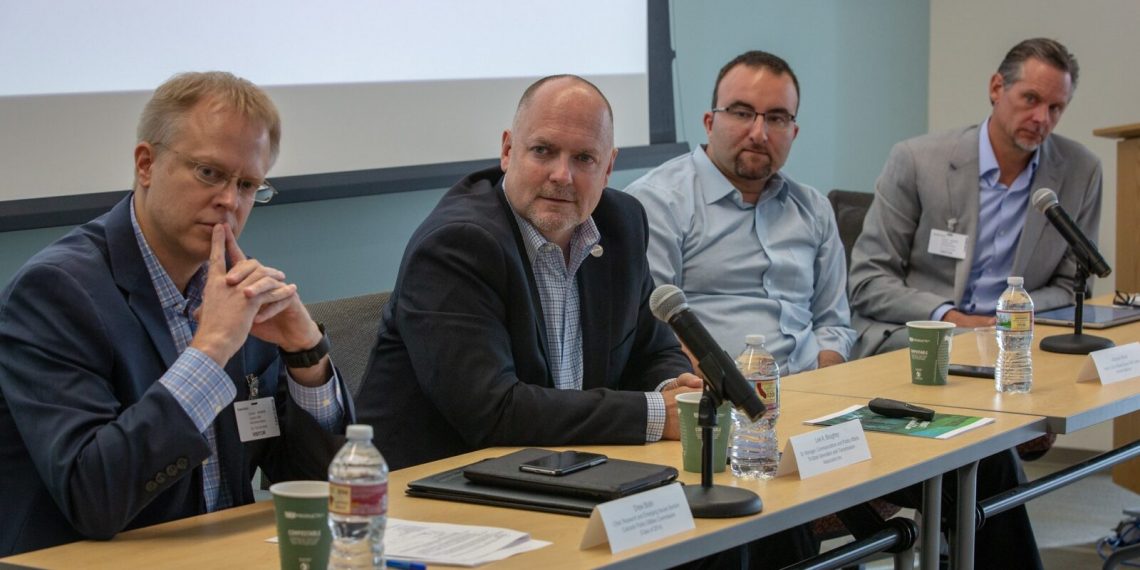
Originally published at ILSR.org
After moving to Colorado, Joe Smyth found he was barred from participating in his generation and transmission cooperative — despite a Colorado law promoting co-op transparency.
For this episode of the Local Energy Rules Podcast, host John Farrell speaks with Joe Smyth, Researcher at the Energy and Policy Institute and author of CleanCooperative.com. Farrell and Smyth discuss barriers to democratic participation in rural electric cooperative decision-making and how to promote transparency at all electric co-ops.
Listen to the full episode and explore more resources below — including a transcript and summary of the conversation.
Podcast (localenergyrules): Play in new window | Download | Embed
Subscribe: Stitcher | RSSEpisode Transcript
Reforming the rural electric cooperative
Joe Smyth has a history of environmental activism and clean energy advocacy but did not take an interest in electric cooperatives until he was served by one. At a board meeting for his cooperative, Smyth watched as the co-op leaders grappled with the declining costs of solar energy.
In his view, the cooperative had two choices: treat solar energy as a threat and clamp down on net metering, or embrace the transition and support members as they go solar. He soon realized, however, that their decision was not that simple. Distribution cooperatives like his get their power from a larger wholesale power provider: the generation and transmission cooperative.
Rural electric cooperatives are a product of the New Deal era. Since it was not profitable to electrify sparsely-populated areas, rural America was left in the dark. The Rural Electrification Act of 1936 established hundreds of electric cooperatives which, with no shareholders or profit motive, could serve these areas with less overhead cost. Because electric co-ops are not-for-profit and owned by the customers, they are often unregulated by state agencies. Without that oversight, many cooperatives are falling behind as the electricity sector undergoes a rapid transition.
Customer-owners face participation barriers
In the absence of state law, electric cooperatives can set their own rules — including whether co-op members can attend board meetings. They can also decide what information they will publish and what to withhold. Without access to information, it is difficult for member-owners to have any input and influence over their cooperative.
We see some coops making decisions really behind closed doors, not informing their members about why they made decisions of where the electric cooperative is going as we transition away from coal
Colorado has long had a law ensuring cooperative transparency and access to board meetings. However, that transparency and access did not apply to the generation and transmission cooperative Tri-State. Since Tri-State’s decisions have “huge implications” for the coops they serve, says Smyth, there was a call for those decisions to be made in a public forum. A 2021 bill enacted by the Colorado General Assembly enforces that public forum.
We can’t have a democratically run utility unless there’s transparency and accountability.
Distribution cooperatives break free of their contracts
Prior to the 2021 bill, two electric co-ops successfully left Tri-State’s umbrella: Kit Carson Electric in New Mexico and Delta Montrose Electric Association in Colorado. These distribution cooperatives found that they could get cheaper wholesale rates elsewhere. The two co-ops, bound by the principle “concern for community,” also wanted to satisfy the local demand for renewable energy capacity.
Both Kit Carson and Delta Montrose faced multi-year processes to get out of their contracts with Tri-State. As the two broke away, the other distribution co-ops supplied by Tri-State watched carefully. Tri-State does not want to lose any more members, especially its largest customers. Because of this threat, says Smyth, Tri-State may now be willing to offer more flexibility to its remaining members.
Listen to our 2018 interview with Kit Carson General Manager Luis Reyes and our 2016 interview with Delta Montrose former Board Member Ed Marston.
Does Tri-State have a future?
To have any future at all, says Smyth, Tri-State needs to transition away from coal — it’s just too expensive. He hopes in that transition away from coal, Tri-State will also empower members to participate in decision making. Co-ops don’t just want affordable, clean energy, says Smyth. They want to provide input and support their communities.
What’s clear is that Tri-State now understands that they have to transition away from their uneconomic coal plants, both to keep their member co-ops and to comply with the rules that Colorado and New Mexico have… but whether they do that in a way that just reinforces the fairly centralized, top-down decision-making processes that they’ve historically operated under, or that more empowers their electric cooperative members, the distribution utilities, to do what makes sense for their communities, that’s not clear yet.
Episode Notes
See these resources for more behind the story:
For concrete examples of how towns and cities can take action toward gaining more control over their clean energy future, explore ILSR’s Community Power Toolkit.
Explore local and state policies and programs that help advance clean energy goals across the country, using ILSR’s interactive Community Power Map.
This is the 139th episode of Local Energy Rules, an ILSR podcast with Energy Democracy Director John Farrell, which shares powerful stories of successful local renewable energy and exposes the policy and practical barriers to its expansion.
Local Energy Rules is Produced by ILSR’s John Farrell and Maria McCoy. Audio engineering by Drew Birschbach.
This article originally posted at ilsr.org. For timely updates, follow John Farrell on Twitter, our energy work on Facebook, or sign up to get the Energy Democracy weekly update.
Featured Photo Credit: National Renewable Energy Lab via Flickr (CC BY-NC-ND 2.0)






